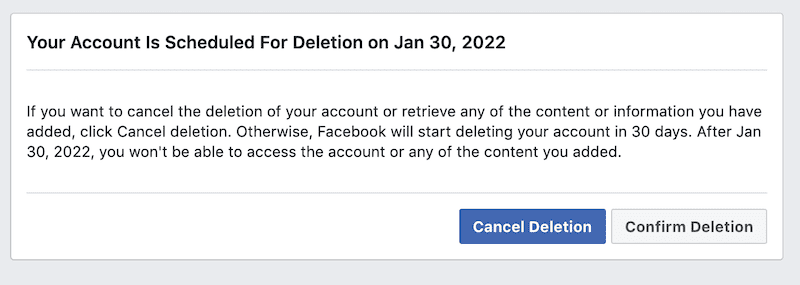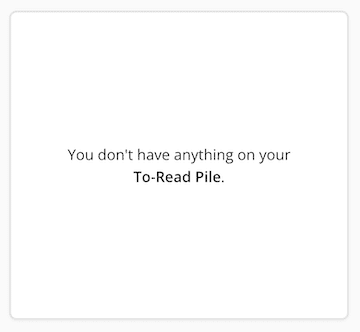Unfriending Facebook, Instagram and Goodreads
On the last day of 2021, I deleted my Facebook and Instagram accounts. Two days later, I also deleted my Goodreads account. Not exactly a new year’s resolution, but more like a decision to not bring those things with me into my new year.
This decision was something I saw as an eventuality. Even as I continued to use the services — running a Facebook group, liking photos on Instagram — I knew I was bound to give them up. And, as I shared that I was leaving those platforms, I really didn’t have to explain or justify this move to anyone1 — I think folx are pretty used to the idea — and, instead, mostly had to come to terms with how long I had existed in this state of knowing I’d leave, planning to leave, but still not completing the action.
Why did it take so long to leave? #
I think FOMO pretty accurately describes my answer. Those networks are where my friends and family are. Through Facebook, I see my nieces and nephew growing up, I stay connected to a larger pool of people across the globe, and am made aware of local social events. Instagram let me see friends’ families, holidays and creations and also benefit from insights from authors and others I respect. Goodreads introduced me to new books and let me bond with friends over shared reads.
Leaving those platforms makes me feel disconnected from all that, and that’s no small thing.
It’s not great to think I’ll miss out on a friend’s party or birth announcement because I’m not on the platform where that info gets shared. This let me continue on, even as the news and implications about Facebook/Meta got more and more dire.
Over the last year, hearing about friends who are struggling with family members deep into conspiracy theories, watching Facebook fumble decisions around the January 6th insurrection (and then attempt to minimize their impact) all had their toll. And then came Frances Haugen’s testimony and the documents she released — learning that Facebook had put in place changes to decrease the promotion of inflammatory content leading up to the election and then chose to undo those changes really did me in. That was the proverbial straw on this camel’s back.
“Facebook has realized that if they change the algorithm to be safer, people will spend less time on the site, they’ll click on less ads, they’ll make less money.”
Maybe it’s because of my own experience as a software engineer, but I really felt I understood the process to specifically undo those changes; I understood that there were meetings and Jira tickets enabling this. And yet it still happened. Something about that just made Facebook irredeemable in my eyes.
I’ve mostly talked about Meta’s products here, and they were definitely the focus of this specific effort. Since I also have made the choice to use less of Amazon’s services (like cancelling my Prime membership), Goodreads got lumped into this effort as a last-minute, “Oh, yeah, them, too.”2
Speaking of process #
Leaving all three platforms was, in terms of process, pretty straightforward. I began by downloading my data from each platform: Facebook and Instagram gives you options about which data to download and what format (HTML or JSON) you wish to receive your data, and Goodreads provides a CSV of all your read or tagged books. The Facebook and Instagram downloads are not instantaneous; you must first request the download, await an email confirming it’s done, then log in to actually download the file.
After I was in possession of my data, I could then delete my accounts. Again, Facebook and Instagram don’t do this immediately — instead, you get a notice that you have 30 days to prevent or undo the full deletion of your account.

Despite only posting to Instagram twice last year, I still actively browsed my Instagram feed and used the app in other ways. Unexpectedly3, it felt harder to leave than the other two services. Before deleting my account, I opted to review each person and account I was following and actually unfollow them. This is a wholly unnecessary and even pointless step, but seeing each name and reflecting even a moment on what I got out of viewing their photos and posts was helpful to me. It gave me the opportunity to acknowledge the good I was experiencing from the individuals on the platform — the ways they inspired my creativity, the things they taught me about antiracism, the insights into their lives — even as I was deleting my account. (Only afterward, as I was describing my actions to a friends, did I see the resemblance to “letting go with gratitude” in the KonMari method.)
Helpful links #
If you’re looking to do this yourself, this gist provides links to instructions for both Facebook and Instagram. 👍🏻
I also was inspired and informed by Jess Gartner’s three-part description of how she, too, left and replaced Facebook:
What’s next? #
Some of the services I’ve left I hope to replace in pretty straightforward ways, while in other cases, I’m going to get more creative.
When I posted that I was leaving Facebook, one of the surprising and delightful things I heard was that folx were going to miss seeing my drawings and the other things I’m making. So, rather than replacing Facebook with another service, I instead collected some addresses and am in the process of sending out my first round of mail art. I’ll be connecting with fewer people, but hope there will be more delight in our interactions.
For Instagram, I’m taking a beat to consider what I want to get out of sharing photos online. If it’s connection, I may sign up for a fediverse network like Pixelfed. If it’s instead the ability to share and view my own photos, I may opt instead to build something with Eleventy and create a subdomain of this blog.4
Goodreads was the most straightforward to replace — I had already signed up for The StoryGraph to explore its options and recommendations, so I simply imported my Goodreads data to their service.
Well, almost all my data.

In another fit of new year energy, I opted to not import the books I’d tagged to read and start my StoryGraph account with a clean slate.5
In addition to The StoryGraph, there are several other Goodreads alternatives, like BookWyrm (which is also a fediverse network) and Literal (which I heard of via Jason Becker). I may dig into those, too, depending on my motivation and how I find The StoryGraph.
Final thoughts #
I don’t have any epiphanies to share in this post-Facebook life nor do I really expect to. Mostly, I’m sharing this because I was motivated by other people’s stories and can only hope to pay that forward. Maybe you, too, have existed for awhile in the space of knowing you’d like to quit Facebook/Instagram/EnterServiceHere. Maybe you, too, know how not doing the thing can drag at your momentum to ever do the thing. No judgement — this whole post is pretty much me owning up to existing in that space for years.
As always, feel free to send comments to me via Twitter. (NB: As of 2025, I am no longer using Twitter.) I'd be happy to answer any questions you have about the process as I experienced it or to hear your thoughts about Instagram and Goodreads alternatives.
- My reasons, if it's helpful, aren't about all social networks being terrible and are much more about the values and impact of Meta and Amazon (which acquired Goodreads in 2013) specifically. ⤴
- Consider it collateral damage from Bezos launching himself into space. 🚀 ⤴
- Unexpected to me. I'm sure there are others who find this to be wholly expected and even intentional. ⤴
- Even if this isn't wholly practical, since I'm not coding in my new role, it has some special appeal. ⤴
- Since I have my Goodreads data, this info isn't lost, it's just not in The StoryGraph. ⤴
3 Likes